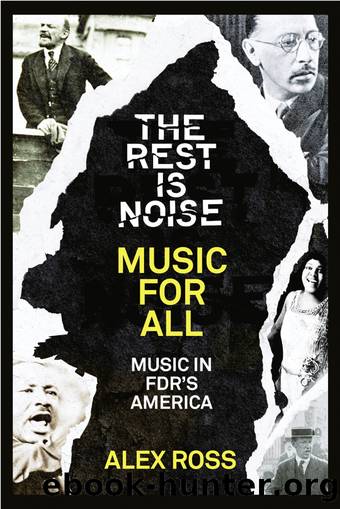The Rest Is Noise Series by Alex Ross

Author:Alex Ross
Language: eng
Format: epub
Publisher: HarperCollins Publishers
Published: 2012-11-22T00:00:00+00:00
In the elections of 1938, the Republicans picked up a large number of seats in Congress and joined forces with conservative Democrats to mount an assault on the New Deal. The House Un-American Activities Committee, under the leadership of Congressman Martin Dies, launched an investigation of the WPA, and the arts programs proved a juicy target. Congressman J. Parnell Thomas charged that the Theatre Project was âone more link in the vast and unparalleled New Deal propaganda machine.â The Music Project faced a separate challenge from the American Federation of Musicians, which saw government-funded performances as unfair competition for professional orchestras, opera companies, and bands. Roosevelt came to the conclusionâjustified or notâthat the broad American middle would not accept the burden of âencouraging art, music, and literature,â as he put it in a letter to Nelson Rockefeller.
The death knell for the federal arts programs sounded on June 30, 1939, when Congress called for the abolition of the Federal Theatre Project and allowed the other arts projects to continue only under state and local sponsorship. Roosevelt made a show of decrying the way in which the FTP had been singled out for abuse, claiming that it could have carried on under the terms extended to the other divisions, but all that was a whitewash: as had been predicted in the House hearings, few WPA organizations were able to survive on local support alone.
A late efflorescence of WPA spirit took place at the New York Worldâs Fair, which opened in Queens in April 1939. Money for this grand venture came largely from private sources, but New Deal idealism still filled the air, blending uneasily with the adspeak of corporate America. Millions of visitors gazed awestruck at the self-styled âWorld of Tomorrowââthe sleek forms of the Trylon and Perisphere at the center of the fairgrounds; the âFuturamaâ spectacular, with its radiant vision of suburban communities interconnected by superhighways; and, at the RCA pavilion, a device called television, which the ever-optimistic David Sarnoff hailed as âa new art.â Roo seveltâs Four Freedoms were monumentalized in sculptures that Mussolini might have found appealing.
Several prominent composers of Popular Front orientation contributed to the fair, struggling to reconcile their ideals with the requirements of big business. Weill wrote music for the historical pageant Railroads on Parade, in which fifteen working locomotives moved across a massive reinforced stage and blew their whistles on cue. Eisler, suspending his anticapitalist crusade, teamed with Joseph Losey on the puppet film Pete Roleum and His Cousins, which explained the oil industry to children.
Copland, for his part, wrote a score for a film documentary titled The City, which played every day on the fairgrounds. The narration, written by Lewis Mumford, advanced the thesis that the American city had become frenzied, oppressive, and inhumane. First, New England scenes illustrate a golden age before humanity and nature fell out of balance, Coplandâs music making liberal use of plainspoken melody and pure-hearted harmony. Then industry invades. âSmoke makes prosperity,â the narrator intones, âno matter if you choke on it.
Download
This site does not store any files on its server. We only index and link to content provided by other sites. Please contact the content providers to delete copyright contents if any and email us, we'll remove relevant links or contents immediately.
| Biographies | Business |
| History & Criticism | Instruments |
| Musical Genres | Recording & Sound |
| Reference | Songbooks |
| Theory, Composition & Performance |
The Goal (Off-Campus #4) by Elle Kennedy(13678)
Kathy Andrews Collection by Kathy Andrews(11839)
Diary of a Player by Brad Paisley(7584)
Assassin’s Fate by Robin Hobb(6225)
What Does This Button Do? by Bruce Dickinson(6208)
Big Little Lies by Liane Moriarty(5806)
Altered Sensations by David Pantalony(5106)
Pale Blue Dot by Carl Sagan(5012)
Sticky Fingers by Joe Hagan(4204)
The Death of the Heart by Elizabeth Bowen(3625)
The Heroin Diaries by Nikki Sixx(3552)
Confessions of a Video Vixen by Karrine Steffans(3311)
Beneath These Shadows by Meghan March(3309)
How Music Works by David Byrne(3272)
The Help by Kathryn Stockett(3150)
Jam by Jam (epub)(3095)
Harry Potter 4 - Harry Potter and The Goblet of Fire by J.K.Rowling(3076)
Computational Linguistics and Intelligent Text Processing: 20th International Conference, CICLing 2019 La Rochelle, France, April 7â13, 2019 Revised Selected Papers, Part I by Alexander Gelbukh(2995)
Strange Fascination: David Bowie: The Definitive Story by David Buckley(2872)
